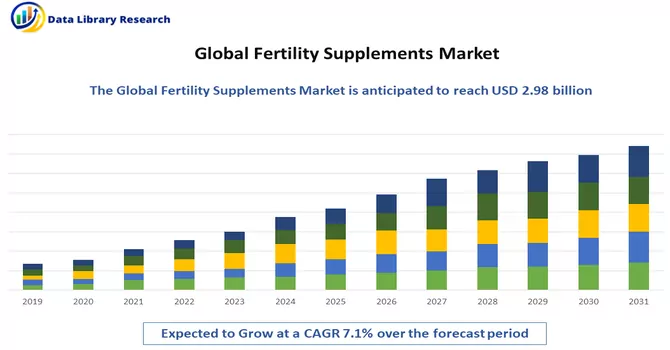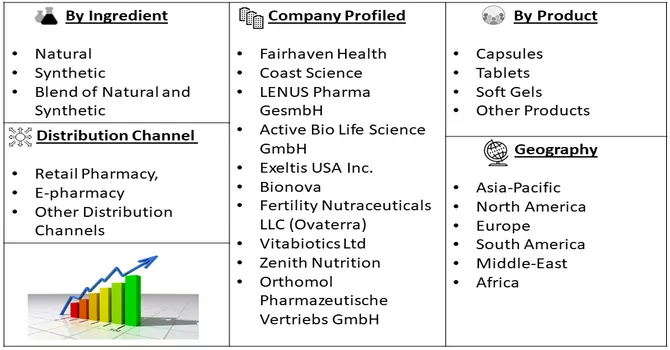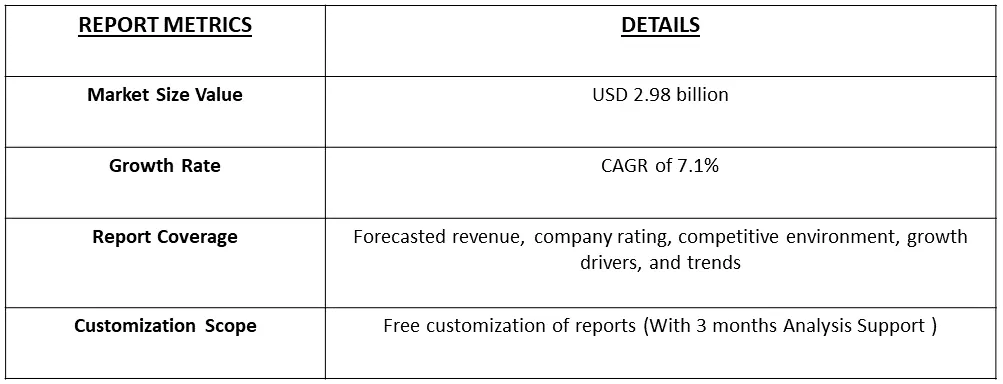The Fertility Supplement Market size is estimated at USD 2.98 billion in 2023 and is expected to register a CAGR of 7.1% during the forecast period (2024-2031).

Get Complete Analysis Of The Report - Download Free Sample PDF
A fertility supplement is a dietary product formulated with specific vitamins, minerals, antioxidants, and other nutritional components designed to support and enhance reproductive health in both men and women. These supplements are intended to address potential nutritional deficiencies that may impact fertility and reproductive function. Fertility supplements often contain ingredients such as folic acid, iron, zinc, vitamin E, and various herbal extracts that are believed to promote hormonal balance, improve egg and sperm quality, and support overall reproductive well-being. It's important to note that while fertility supplements may be beneficial for some individuals, consulting with a healthcare professional is advisable before starting any supplementation, as fertility issues can have various underlying causes, and personalized medical guidance is essential.
The growth of the fertility supplements market is propelled by a confluence of factors, including increasing awareness and education about reproductive health, delayed parenthood trends, a rising incidence of infertility, advancements in research and development leading to evidence-based formulations, nutritional deficiencies in modern diets, the impact of stress and lifestyle factors on fertility, evolving cultural attitudes towards family planning, a growing focus on male fertility, technological advancements in supplement formulations, and the expanding distribution channels. As individuals become more proactive in addressing fertility concerns, the demand for fertility supplements continues to rise, supported by a holistic approach to reproductive well-being and the availability of innovative products catering to diverse needs.
The fertility supplements market is characterized by several dynamic trends shaping the industry landscape. Increasing awareness and education about fertility issues drive consumers towards proactive family planning, while a notable surge in demand for male fertility supplements reflects a more inclusive perspective on reproductive health. The market embraces personalized formulations catering to individual needs, leveraging technological innovations in delivery systems and ingredients. Holistic approaches to reproductive well-being, including lifestyle modifications, stress reduction, and the preference for natural and herbal ingredients, are influencing consumer choices. E-commerce platforms play a pivotal role in enhancing accessibility, and there is a growing focus on environmentally sustainable practices in supplement manufacturing. Additionally, the integration of nutraceuticals and cross-industry collaborations between supplement manufacturers and healthcare professionals contribute to a dynamic and evolving fertility supplement market.
Market Segmentation: The Global Fertility Supplement Market is Segmented by Ingredient (Natural, Synthetic, and Blend of Natural and Synthetic), Product (Capsules, Tablets, Soft Gels, and Other Products), Distribution Channel (Retail Pharmacy, E-pharmacy, and Other Distribution Channels), and Geography (North America, Europe, Asia-Pacific, Middle-East and Africa, and South America). The market provides the value in USD million for the above segments.

For Detailed Market Segmentation - Download Free Sample PDF
Market Drivers:
Increasing Infertility Rate
The increasing infertility rate worldwide has spurred a growing interest in the use of fertility supplements as individuals and couples seek proactive solutions to address reproductive challenges. Various factors contribute to the rising incidence of infertility, including lifestyle factors, stress, environmental pollutants, and delayed family planning. Fertility supplements have gained prominence as a complementary approach to conventional treatments, offering a range of vitamins, minerals, antioxidants, and herbal extracts believed to enhance reproductive health. These supplements aim to address nutritional deficiencies, support hormonal balance, and optimize overall fertility potential. As awareness of infertility issues grows, individuals are turning to fertility supplements as part of a holistic strategy to improve reproductive outcomes. The market's expansion is fueled by advancements in research, formulation innovations, and a broader understanding of how lifestyle and nutrition impact fertility. The use of fertility supplements underscores a proactive and personalized approach to reproductive well-being in response to the increasing challenges posed by infertility.
Increasing Demand for Natural Ingredients
The fertility supplement market is experiencing a notable surge in demand for products enriched with natural ingredients, reflecting a consumer preference for holistic and plant-based approaches to reproductive health. With an increasing awareness of the potential benefits of herbs and botanical extracts, such as chasteberry, maca root, and ginseng, consumers are seeking fertility supplements that align with their desire for clean, sustainable, and environmentally friendly options. This shift towards natural ingredients not only underscores a preference for perceived efficacy but also drives innovation in formulations, influencing the competitive landscape of the fertility supplement market. As individuals prioritize preventive healthcare, the market is witnessing a paradigm shift where the emphasis on natural alternatives is shaping the future trajectory of reproductive wellness solutions.
Market Restraints:
Government Regulations to Control Birth Rate
Government regulations aimed at controlling birth rates could potentially impede the growth of the fertility supplement market. Restrictions or policies implemented by authorities to manage population growth, whether through family planning initiatives or other measures, might influence the demand for fertility supplements. In regions where stringent regulations discourage or limit childbirth, there may be a decreased incentive for individuals or couples to seek fertility-enhancing products. Additionally, regulatory scrutiny over the marketing, labeling, or health claims of fertility supplements may pose challenges for manufacturers in conveying the benefits of their products to consumers. Consequently, the fertility supplement market may face obstacles in regions where government interventions prioritize population control strategies over supporting reproductive health. However, the impact would likely vary based on the specific nature and extent of government regulations in different geographic locations.
The demand for fertility supplements experienced a surge during the COVID-19 pandemic, driven by emerging research suggesting a potential link between the virus and fertility levels. Notably, a January 2021 article titled "Potential Role of Zinc in the COVID-19 Disease Process and its Probable Impact on Reproduction" highlighted the positive impact of zinc supplements in mitigating damage to egg and sperm cells caused by the body's immune response to the coronavirus, thereby enhancing immunity. Subsequent research from the Wayne State University School of Medicine in February 2021 indicated that individuals attempting to conceive during the pandemic might bolster their immunity against the virus and prevent mitochondrial damage in young eggs and sperm cells. These findings, underscoring the potential benefits of fertility supplements, contributed to an increased demand for such products during the pandemic, thereby positively influencing the market.
Segmental Analysis:
Natural Segment is Expected to Witness Significant Growth Over the Forecast Period
Natural fertility supplements are a category of dietary supplements designed to support reproductive health and enhance fertility using naturally derived ingredients. These supplements often include a blend of vitamins, minerals, herbal extracts, and antioxidants, all chosen for their potential positive effects on fertility. Common natural ingredients found in these supplements include vitex (chasteberry), maca root, coenzyme Q10, and various vitamins like B-complex and vitamin E. Vitex, derived from the chaste tree, is believed to regulate hormonal balance, particularly in women, potentially aiding menstrual cycle regularity. Maca root, a plant native to Peru, is often associated with increased libido and energy, while coenzyme Q10 is known for its antioxidant properties that may benefit both male and female reproductive systems. Natural fertility supplements are frequently sought after by individuals and couples looking for alternatives to conventional fertility treatments. They are often perceived as a holistic approach to reproductive health, addressing nutritional gaps and supporting the body's natural processes. Additionally, these supplements are generally well-tolerated with fewer side effects compared to pharmaceutical interventions. While natural fertility supplements have gained popularity, it's important for individuals to consult with healthcare professionals before incorporating them into their routine. Understanding the specific needs of each individual and addressing any underlying fertility issues is crucial for optimizing the effectiveness of natural fertility supplements. As with any dietary supplement, the quality and formulation of natural fertility supplements can vary, emphasizing the importance of choosing reputable brands and products backed by scientific research.
Capsule Segment is Expected to Witness Significant Growth Over the Forecast Period
Fertility supplement capsules are a convenient and popular form of reproductive health support, encapsulating a blend of natural ingredients specifically chosen to enhance fertility. These capsules often comprise vitamins, minerals, antioxidants, and herbal extracts, such as vitex and maca root, known for their potential positive impact on reproductive well-being. The encapsulation provides an easily consumable and controlled dosage, allowing individuals and couples to integrate fertility support seamlessly into their daily routines. As a widely favoured option, these capsules cater to those seeking a holistic and natural approach to fertility enhancement, emphasizing nutritional support for both men and women. However, it is essential for users to consult with healthcare professionals before incorporating these capsules into their regimen to ensure personalized and well-informed choices for optimizing reproductive health.
Retail Pharmacy Segment is Expected to Witness Significant Growth Over the Forecast Period
Retail pharmacies play a pivotal role in the distribution and accessibility of fertility supplements, contributing to the dynamics of the fertility supplement market. As consumer awareness of reproductive health grows, retail pharmacies serve as key outlets where individuals can easily access a variety of fertility supplements. These supplements, often available in the form of capsules, tablets, or powders, line the shelves of retail pharmacies, offering consumers a diverse range of options to support their fertility journey. The retail pharmacy setting provides a convenient platform for consumers to seek advice from pharmacists or healthcare professionals regarding the selection of fertility supplements, ensuring informed choices aligned with individual needs. Additionally, the presence of fertility supplements in retail pharmacies enhances visibility and awareness, further encouraging individuals to explore and integrate these products into their wellness routines. The retail landscape also reflects the competitive nature of the fertility supplement market, as various brands and formulations vie for shelf space and consumer attention. Frequent promotions, discounts, and educational materials within retail pharmacies contribute to consumer engagement and informed decision-making. Moreover, the retail pharmacy setting aligns with the broader trend of consumers increasingly seeking over-the-counter solutions and self-care options. The accessibility and convenience offered by retail pharmacies make them integral players in the distribution chain of fertility supplements, influencing consumer choices and market dynamics in the realm of reproductive health. As the demand for fertility supplements continues to rise, the strategic positioning of these products within retail pharmacies underscores their significance in catering to the evolving needs of individuals and couples seeking fertility support.
North America Region is Expected to Witness Significant Growth Over the Forecast Period
North America is poised for substantial growth in the coming years, driven by a rising awareness of overall health and an increasing infertility rate among the population. Notably, data from the CDC revealed that in the United States, 14.1% of married women aged 15 to 49 experienced impaired fertility, while 6% were found to be infertile. The PRB's observations in August 2021 indicated a consistent decline in fertility rates for women across age groups in both high and low-income countries. The World Health Organization identified various factors contributing to infertility, including increased alcohol consumption, smoking, obesity, and heightened stress levels causing hormonal imbalances. Correspondingly, data from the US HHS in January 2022 highlighted concerning health statistics, such as 40.5% of males over 20 being obese, 15.3% of men over 18 being frequent smokers, and 51.9% of men over 20 having hypertension. Given the correlation between these factors and infertility, a growing population in the region is turning towards fertility supplements, recognized as a valuable source of micronutrients to support fertility. With declining fertility rates among women and an increasing number of infertile males, the demand for fertility supplements is on the rise, contributing to the anticipated growth of the fertility supplement market in the region throughout the forecast period.

Get Complete Analysis Of The Report - Download Free Sample PDF
The fertility supplement market demonstrates a notable level of consolidation, marked by intense competition among a restricted number of key players. The limited market participants engage in vigorous competitive strategies, with a primary focus on the introduction of novel products. This constant influx of new offerings contributes to a reasonably elevated bargaining power held by consumers. The competitive landscape is shaped by the continuous efforts of existing market players to distinguish themselves through innovative product launches. This heightened competition underscores the significance of product differentiation as companies strive to capture consumer attention and maintain a competitive edge in the fertility supplement market.
Recent Development:
1) In April 2022, Fertility Nutraceuticals introduced two new prenatal vitamin supplements under the brand Ovaterra. Specifically designed for pregnant and nursing women, these prenatal capsules come formulated with the complete recommended daily value of choline. Notably, they are conveniently packaged in individual servings, catering to on-the-go lifestyles and enhancing ease of use.
2) Similarly, in February 2022, EMD Serono, the healthcare division of Merck KGaA, unveiled its Slim Pack fertility medication packaging. This innovative launch focuses on reducing packaging size for both convenience and a positive environmental impact. By emphasizing portability, efficiency, and overall convenience, the Slim Pack initiative aims to enhance the user experience for individuals utilizing fertility medications.
Q1. What was the Fertility Supplements Market size in 2023?
As per Data Library Research the Fertility Supplement Market size is estimated at USD 2.98 billion in 2023.
Q2. What is the Growth Rate of the Fertility Supplement Market?
Fertility Supplement Market is expected to register a CAGR of 7.1% during the forecast period.
Q3. What segments are covered in the Fertility Supplement Market Report?
By Ingredient, By Product, By Distribution Channel and Geography these segments are covered in the Fertility Supplement Market Report.
Q4. What are the factors driving the Fertility Supplement Market?
Key factors that are driving the growth include the Increasing Infertility Rate and Increasing Demand for Natural Ingredients .
Data Library Research are conducted by industry experts who offer insight on industry structure, market segmentations technology assessment and competitive landscape (CL), and penetration, as well as on emerging trends. Their analysis is based on primary interviews (~ 80%) and secondary research (~ 20%) as well as years of professional expertise in their respective industries. Adding to this, by analysing historical trends and current market positions, our analysts predict where the market will be headed for the next five years. Furthermore, the varying trends of segment & categories geographically presented are also studied and the estimated based on the primary & secondary research.
In this particular report from the supply side Data Library Research has conducted primary surveys (interviews) with the key level executives (VP, CEO’s, Marketing Director, Business Development Manager and SOFT) of the companies that active & prominent as well as the midsized organization
FIGURE 1: DLR RESEARH PROCESS

Extensive primary research was conducted to gain a deeper insight of the market and industry performance. The analysis is based on both primary and secondary research as well as years of professional expertise in the respective industries.
In addition to analysing current and historical trends, our analysts predict where the market is headed over the next five years.
It varies by segment for these categories geographically presented in the list of market tables. Speaking about this particular report we have conducted primary surveys (interviews) with the key level executives (VP, CEO’s, Marketing Director, Business Development Manager and many more) of the major players active in the market.
Secondary ResearchSecondary research was mainly used to collect and identify information useful for the extensive, technical, market-oriented, and Friend’s study of the Global Extra Neutral Alcohol. It was also used to obtain key information about major players, market classification and segmentation according to the industry trends, geographical markets, and developments related to the market and technology perspectives. For this study, analysts have gathered information from various credible sources, such as annual reports, sec filings, journals, white papers, SOFT presentations, and company web sites.
Market Size EstimationBoth, top-down and bottom-up approaches were used to estimate and validate the size of the Global market and to estimate the size of various other dependent submarkets in the overall Extra Neutral Alcohol. The key players in the market were identified through secondary research and their market contributions in the respective geographies were determined through primary and secondary research.
Forecast Model
